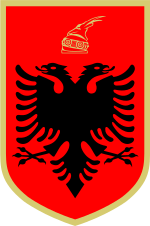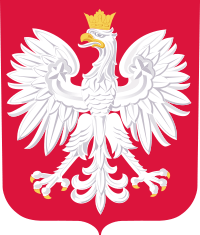Albania–Poland relations
The Albanian–Polish relations refers to historical and current bilateral relations between the Republic of Albania and the Republic of Poland.
 | |
Albania |
Poland |
|---|---|
History
Albanian-Polish ties date back to the Middle Ages,[1] and in the time of Skanderbeg, the two nations were allied against the Ottoman Empire.[2] The oldest known Polish-Albanian correspondence was a letter from King Wladyslaw to Skanderbeg.[1] In the following centuries, thousands of books were published in Poland about Skanderbeg, and he was recognized as a Christian knight.[1]
The two countries share historical commons, such as the bond of Roman Catholicism when Albania's most revered figure, Skanderbeg was a Catholic Albanian who led the fight against Ottoman invasion to Europe, which was recognized by Polish-born Pope John Paul II as a savior; Poland was the first Slavic nation to recognize Kosovo as an independent entity, the relationship between two nations is quite low than expected. Nonetheless, two countries have been working closer since the fall of communism at 1989 and there has been strong renewal of relationship between two nations.[3]
Stanislaw Zuber, a mid 20th century Polish geologist, was the author of the first extensive geological map of Albania, which is still in use throughout Albania today.[2] The first telegraph line from North Albania to Istanbul, as well as the first to Manastir, was also constructed by Poles.[1]
After Albania split from the Soviet bloc, Albanian-Polish relations came to a halt; after the fall of communism, however, they were resuscitated with considerable contribution by the foundation of the Albanian-Polish Friendship Society, which was created by Albanians who had once studied abroad in Poland.[1] Today, the shared experience of communist rule is a source of shared "understanding".[1]
In 2016, the first economic forum between Poland and Albania was held.[1]
On 26 November 2019, an earthquake struck Albania. At the request of the Albanian government, Poland in late December sent 4 firefighter teams to the country and 500 field beds in earthquake aid.[4]
Kosovo
Kosovo, a region where Albanians formed majority, declared its independence from Serbia on 17 February 2008 and Poland recognized it on 26 February 2008.[5] While Albania was one of the earliest nations to recognize Kosovo due to common culture, Poland was the first Slavic country to do so. However, in September 2008, President of Poland, Lech Kaczyński, stated that the original cause of the 2008 South Ossetia war was not the Georgian operation, but the recognition of Kosovo's independence[6] and that he would block attempts to establish diplomatic relations of Poland with Kosovo at ambassadorial level; however, the government has not proposed to send an ambassador to Pristina.[7]
Nonetheless, Poland had (as of July 2009) 274 troops serving in Kosovo as peacekeepers in the NATO-led Kosovo Force. Originally there were 800 Polish troops in KFOR.[8]
Cooperation in the Baltic

In the events following the increased tension resulting from the situation in Ukraine, Albania and Poland have both deployed their soldiers as part of a "battle group" in Latvia.[9]
EU accession
Poland is a strong supporter of Albania's accession to the EU.[9] In a bilateral meeting, Jacek Czaputowicz stated that "Poland strongly supports Albania’s membership of the EU... We believe that the people of Albania should receive a clear message that the EU is open and awaits Albania, and that this membership would make the EU more culturally rich... We appreciate the Albanian government’s reform efforts; we are happy that they were noticed by the European Commission, whose report last April made an unconditional recommendation for the Council of the European Union to open accession negotiations".[9]
On May 7, 2018, Czaputowicz stressed the importance of "solidarity" between Eastern European countries, noting that "the Western Balkans are undergoing a similar developmental path as Poland" and thus "have similar interests".[10]
On July 5, 2019, Polish head of state Andrzej Duda "scolded" the EU in a summit as Poznan for delaying membership talks for Albania and North Macedonia, stating "The European Union shouldn't treat countries this way when they are carrying out difficult reforms aimed at future integration".[11]
Economic ties
Albania has emerged as a major tourist destination for Poles, with the number of Polish tourists doubling in 2016 to reach 116,000; Poland is in the top 10 sources of foreign tourists in Albania.[2] For the first eleven months of 2018, that number had grown to stand at 152,000.[12]
Resident diplomatic missions

References
- "Poland and Albania: Connected by the same spirit of freedom". May 5, 2017.
- "Polish-Albanian centuries-old ties featured on new Europa magazine issue". Tirana Times.
- "Albania and Poland to Enhance Diplomatic Relations". May 3, 2013.
- "Polish firefighters deliver 500 field beds to needy in Albania". The First News. 21 December 2019. Retrieved 23 December 2019.
- "Poland Recognizes Kosovo". Archived from the original on 2010-04-12. Retrieved 2017-12-29.
- Let's First Help Georgia, Then Talk about Russia
- "Poland won't open embassy in Priština". Archived from the original on 2008-09-28. Retrieved 2017-12-29.
- "Kosovo Force (KFOR)" www.nato.int Link accessed 21-07-09
- "Minister Jacek Czaputowicz visits Republic of Albania".
- "Polish-Albanian talks start in Tirana". May 7, 2018.
- " "Poland, Germany contradict Macron on EU Balkan enlargement". 5 July 2017.
- "Poles lead Albania tourist growth for second year in row". December 26, 2018.

